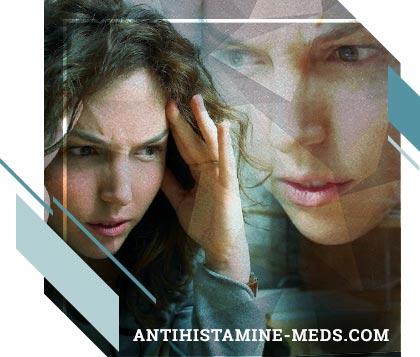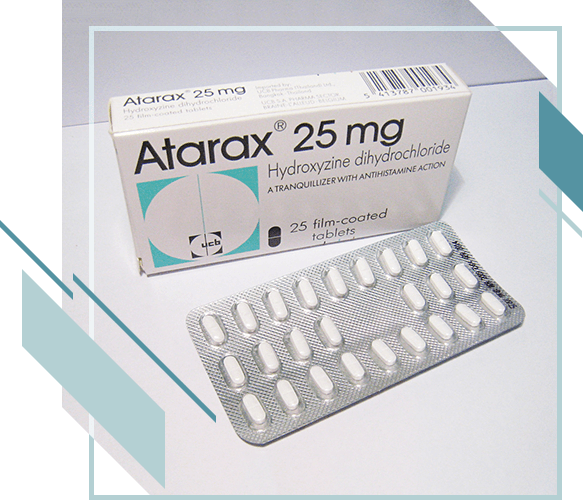Atarax: An Antiallergic with Anxiolytic Properties
Atarax is one of the most frequently used medications in our lifetime. It is an antihistamine, which means that its basic purpose is to act as an allergen, but thanks to advances and extensive medical studies, perhaps it can also be used as an anxiolytic.
Diseases related to allergic reactions are quite common in our environment. We are not only talking about this "skin rash" (which refers to a reddening of the skin, with certain papules in it), but also about other important skin lesions that occur when our system is not well balanced.
These reactions are mediated by allergens, small molecules found in the air or which are part of the composition of living and inert organisms. Our body only recognizes these molecules as "unwanted beings" and this is where all action begins.
A tremendous number of agents and mediators are quickly released, ready to "stop" and prevent the passage of allergens, so that they cannot attack us. The truth is that most of the time these molecules do not cause real damage to our organism, and it is only our immune system overacting and giving a greater response than necessary.

For this reason, sometimes we need a drug that can stop these unnecessary reactions in time, before we can get complicated and the situation becomes much more difficult. That's where Atarax comes in, an antihistamine primarily charged with mediating our body's response to these famous allergens.
Mechanism of Action
The way in which Atarax works is quite complex and we are going to make it as simple as possible. We must know that the action depends on several areas of the central nervous system, especially in the brain, although it has effects that spread throughout our body.
What antihistamines do is that they block the effects of histamine, one of the most important mediators in the development of allergic reactions. According to specialists, histamine is responsible for stimulating the production of other mediators and even specialized white cells that increase allergic reactions.
By blocking histamine, we are not only preventing the onset of symptoms typical of allergic reactions, but we can also reverse them. It should be noted that, as its effect is at the central level (in the brain), it can also be considered for other important functions such as preventing vomiting and anxiety disorders.
Even so, it is necessary to point out that only your doctor will know when is the right time to use the medicine, and if there is any other pathology where its mechanism of action can be really useful. Let us remember that we are not all the same, and not all of us respond in the same way and with the same strength to a drug.
Uses of Atarax
As we have mentioned since the beginning of the article, there are several important uses that need to be highlighted. However, only your doctor and specialist will be able to recommend the use of this medicine. Some people use it on their own without the need to consult a specialist, but we emphasize that it is not ideal.
Antiallergic
The first use is the most conventional and the most spoken by all pharmacies. It is its innate ability to block the production of histamine and thus most reactions that take place in our body when there is an allergen or unknown substance in contact with us.
It is important to emphasize that there are several different types of allergic reactions, depending on the magnitude and mechanism of action, some of which could become lethal. For example, when we are allergic to wasp toxin and meet it, we can die quickly.
Atarax is not useful in those more severe cases of allergies, but in those that are milder and involve other sectors and other different symptoms. For example, if we feel some stinging or itching after touching an unknown plant, that would be a mild symptom of an allergic reaction that this drug could mediate with high effectiveness.
On the other hand, some reactions take longer to appear, such as the chaos of chronic urticaria where there are "beans" throughout the body, and can quickly compromise some other more sensitive regions such as our larynx or throat. It is necessary to emphasize that, although we can use this drug, the ideal is that we have at hand something with greater potency.
By all this we mean that Atarax is not a "rescue" drug in the case of severe allergic reactions that warrant therapy or hospitalization, but that it can be used as a common drug - even when prescribed by your doctor - to treat mild and moderate allergic reactions that take place especially on your skin.
Still, of course, this is just one of many uses for this drug. The key to its success is that its effect has a central origin, that is, at the level of the brain. Therefore, it can attack several systems at the same time.
Anxiolytic
As the world has progressed, psychiatric disorders have become much more widely known. While it may sound strongly related to psychiatry, anxiety-causing illnesses fall within that classification of medicine.
For many people, it may be a problem that limits the way they cope in their daily lives. For this reason, it is important that anxiety disorders are considered and given the necessary importance, and that they are treated correctly.
Although your specialist is the only one who can tell you what treatment you need, if you have a psychiatric problem, you need to know that Atarax is one of the available options.
As mentioned above, thanks to its direct effect on our brain, this drug can play an important role in triggering anxiety disorders, blocking them, and acting as a potent anxiolytic.
However, it is also important for you to know that these effects are different for each person, so the magnitude of the response to this medication will always vary greatly. For this reason, use as an anxiolytic is not suitable for all people, but for those sensitive to its central effect.
Anyway, it is also necessary to mention that this drug has managed to be as effective as the benzodiazepines, the most mentioned when talking about anxiety. This is positive, given that it gives us a second option for those patients who are resistant to the first line of treatment, and continue with the manifestations of their own disorders.
How Atarax is Used
Your doctor must give you the appropriate doses according to the type of pathology being treated. Remember, it is different to attack a mild allergic problem than it is to cure a complicated anxiety disorder, so it is necessary that the doses vary.
Since it is a drug that acts on the brain directly, we recommend that you do not use larger - and even smaller - amounts for longer than recommended; it could have harmful adverse effects. This medication is used only for short periods, due to these effects on the central nervous system.
Normally, the maximum time for consumption is four months. Once you have completed that period, the important thing is to call and consult with your doctor to find out if you should change your drug or if it really worked. If this is not the case, you cannot reuse it, you must switch to another type of drug.
Atarax comes in tablets of 10 mg and 50 mg, ideal presentations to cover chronic disorders with high effectiveness. Acquiring these concentrations through suspension would be a problem, we would need too much liquid to be able to cover the same amount of medication. The tablets have different coatings, but they are all solid.
If it is a liquid form, especially when used to treat allergies, we recommend that you shake the suspension before taking it. On the other hand, measure the amount of medicine you are going to consume with the same syringe as the product; if you don't bring it, ask your pharmacist for a measuring spoon or cup.
What happens if I miss a dose?
The most important thing is to take the missed dose again as soon as you remember. However, you must be very attentive to the time interval and the next dose, if it is very close, it is better to wait the necessary time and take it at the right time. Remember, if you don't do things this way you could harmfully increase the amount of drug in your body very quickly, which is dangerous.
Atarax Overdose
It is dangerous for us to increase the amount of medicine we are going to take. As we mentioned throughout this article, this drug can act on the central nervous system, so it will cause several harmful effects on our body that can even lead to death.
For this reason, if you consider that you consumed more than necessary or experience any of the symptoms mentioned below, we recommend that you go as soon as possible to the nearest emergency room to be evaluated by a specialist.
Some of the signs that make us think that you may be under an overdose are dilation of the pupils - a classic symptom of Atarax overdose - breathing problems, blurred vision, low pressure, fast heartbeat, convulsions, coma, delirium, disorientation, hallucinations, and so on.
As you can see, the alterations on the nervous system end up affecting our whole body and can even lead us to coma. As a good sedative, Atarax can depress the action of the muscles responsible for breathing and lead to respiratory failure quickly. For this reason, as soon as you understand that you are under an overdose, ask for help and go to the emergency room.
Be careful and, to facilitate the work of the doctors who are going to treat you, take with you the name of the drug and the amount you ingested. Also, don't forget to mention that your doctor recommended it and what is the underlying disease you have. With this information, the specialists will be able to proceed quickly and save your life.
In general, just to talk a little about it, the treatment of this overdose in particular is aimed at two things: control respiratory failure (support) and mitigate the possible symptoms that the patient is experiencing. The first thing that is done, normally, is a gastric lavage with endotracheal intubation, depending on the amount of medicine ingested.
Normally, activated charcoal is used, although there are not many studies that support this effect. The most important thing, as mentioned above, is to monitor the state of the airways and breathing, with continuous monitoring, as well as the state of our heart (through the electrocardiogram or any other method available).
Remember that since this medication can directly affect blood pressure, another important point is that the blood pressure should also be evaluated frequently. Finally, it is necessary for the patient to be more than 24 hours without any symptoms in order to be discharged from the hospital. Remember that reactions to medications can also last for several days.
In the case of Atarax, there is no medicine that can be considered as a specific antidote. According to the available studies, the problem is that the effects of the drug are difficult to treat with the drugs that currently exist. Some authors propose mitigating some of the symptoms with other drugs also named as Physostigmine.

However, in order to use this drug, the patient must be in an excellent state of health and must not have consumed too much Atarax, since it can have a very dangerous liver effect. The rest of the symptoms can be treated from the basic principle of "symptom treatment", regardless of possible secondary complications.
Side Effects
Because it has very definite properties on the central nervous system, adverse reactions tend to be quite possible. The most important are those that are related to the brain and its functioning, here sedation, incoordination, walking problems, dizziness, hypersomnia, etc. stand out.
Some more serious disorders, as mentioned above, only occur when there is an overdose of the drug. This is where hallucinations and confusions and even more serious symptoms come in.
Although many claims that this drug, without overdose, could cause serious hallucinatory disorders or act as a sedative so powerful that it leads to respiratory failure, the truth of the case is that it has not been proven by any scientific study. For now, they only remain as lies.
Other side effects include general problems, such as those affecting the gastrointestinal system: diarrhea, nausea, vomiting, etc. There may even be constipation (caused by the same sedative effect, which ends up "appeasing" our digestive system), and dry mouth.
In addition, other important symptoms are hypotension and tinnitus, which occur in a low percentage of the population. It is necessary to mention that this drug is quite related to benzodiazepines, so we can also expect other side effects like those we see with these drugs.
Even so, it is necessary to emphasize that, compared to benzodiazepines, Atarax is a safe drug that affects our system much less in general. Adverse effects and unwanted reactions are much lower for the latter.
Some Recommendations and Precautions Before Using Atarax
Not all patients can use this medicine freely. In fact, there are several important contraindications which we will mention later. Your doctor should evaluate you completely to see if you are a candidate for Atarax.
First, you need to tell your doctor if you are allergic to other drugs like Atarax, such as cetirizine or levotyrizine. If you have had very powerful adverse reactions with these drugs, it is best not to take Atarax, since it may contain similar compounds that cause the same effects.
In addition, you need to talk to your doctor about any possible problems you may have with your body as a result of some other chronic illness you may be suffering from. Some important examples are problems with the lungs (such as asthma), eye (glaucoma), bowel, thyroid, urinary, etc.
With special care, talk to your doctor about any heart problems you have. Although cases are quite rare, Atarax can cause disturbances in the frequency and rhythm of heartbeats, so we must take care of ourselves.
As we know, this medication can also cause hypotension, which would raise the heart rate secondarily. This is especially important in patients who have basal heart problems such as hypertension or any rhythmic problem (atrial fibrillation).
If you have diabetes or any other glucose problem, you need to know that this medication (in the liquid form) may contain sugar, which will alter the metabolism in your body. To avoid aggravating your basal problem, the most important thing is that you do not consume the liquid form of this medicine.
Older adults and children, on the other hand, are two easy targets for this medicine. According to available studies, these two populations appear to be more sensitive to the side effects of this drug. For this reason, if it is necessary to use it, we recommend that you be very careful.
As for the data related to breast milk and pregnancy, the truth is that many studies are still lacking to confirm this. For this reason, we believe that it is best to use it only on extreme occasions, evaluating the "risk-benefit" table, to find out if it is worth it.
The liver and the kidney are two organs with which we must take special care. This is a drug that is widely metabolized in the liver, so any other drug that is metabolized in the same place could saturate it and create the harmful effects of overdose. Even if the patient has some liver injury, it is also quite likely that too much Atarax will accumulate.
The kidney, on the other hand, is the preferred elimination route for this drug, so it is the same as for the liver. If we have a healthy kidney, no problem. But if we have complications in our kidneys, such as kidney disease, it is best not to take this medicine.
Should I take Atarax?
To be honest, it's up to each patient who can or can't take this medicine. As we have mentioned throughout the article, the final answer depends almost exclusively on what your doctor thinks, but also on the diseases you suffer from and other characteristics of your body's metabolism.
For this reason, the truth is that you could try to use this drug, but with low initial doses, to know how your body reacts to exposure to this drug, and then progressively increase to doses that are pharmacologically active. Remember, this is a drug that has action in our brain, so we must be careful.
In addition, Atarax is considered a special medicine for allergies, but it is not the first choice as an anxiolytic. There will always be other options that we can try if treatment fails with one drug or another, no matter what base compounds you were using.
Finally, we must take special care in pediatric patients and older adults, so we do not recommend its use in them unless your doctor believes it is an ideal option. Even so, if used, we must be aware of possible adverse effects and try to control them gradually with other medications or other techniques available, as recommended by your doctor of confidence.
However, it is necessary to emphasize that the most important organizations worldwide in charge of drug safety have determined that Atarax is quite effective and that it does not represent a real risk to our health, if we are supervised. Therefore, we can quietly recommend its use, if your doctor has prescribed it.
Anxiety: Much More Than A Symptom
Mental disorders are pathologies that, although they have existed for many years, the truth is that we are barely achieving worldwide awareness of their importance and the various diseases involved. Although much of the population does not believe it, these disorders are quite incapacitating, and can prevent life completely.
Anxiety is one of the most frequent and under-diagnosed mental illnesses, which means that the statistics do not really reflect the prevalence and incidence of this disorder. These are intense, excessive, persistent worries or fears about situations that, in theory, should not cause a reaction of such magnitude.
It is usually presented as repeated episodes, fast and short, where the patient experiences a lot of fear or terror, with great intensity, which forces him to express various reactions, such as crying, shouting, breathing fast, etc.
All these feelings are extremely difficult to control. Any small event, such as crossing the avenue, could cause us to throw ourselves on the floor for no reason, while we cry and our senseless heart speeds up.
All of this causes us to create strong avoidance behaviors that prevent us from doing our routine activities. Continuing with the same example, perhaps we don't want to cross the street again and try to find a route or a way to reach our destination that doesn't involve crossing a specific street.
Although there are several, the most common are generalized anxiety disorder, social anxiety, specific phobias, or separation anxiety. The worst case scenario is that they could be presented together as more than one disorder inhabiting a patient.
Symptoms
The most interesting thing about this disease is that it puts and demonstrates the clear link that exists between our brain and our body. Most of the psychological affections caused by this disorder have a clear biological effect that is manifested through some alterations as:
- Increased heart rate
- Agitation
- Increased blood pressure
- Increased Heart Rate
- Hyperventilation
- Sweating
- Tremors
- Gastrointestinal disorders
However, it is not limited there. What is certain is that there are also important psychological symptoms such as those we have mentioned previously, such as the birth of preventative behaviors that imply not performing the act we consider to be the trigger.
In addition, it can make it difficult for us to fall asleep, what is known as conciliation insomnia, trouble concentrating, and loss of control over our thoughts. In this state, and at that point, all we can do is think clearly (and too clearly) about our concerns that are overwhelming us at the time.
Risk Factors
Some factors may increase your risk of anxiety. Remember that the basis of the development of this disease are multifactorial conditions that not only indicate psychological problems, but also biological.
1. Trauma
Adults who had strong experiences during childhood or who witnessed some type of traumatic event are those at risk of experiencing anxiety disorder, especially during development and adulthood. In fact, this is the biggest risk factor for any psychiatric illness.
2. Stress
Stress is not only a psychological factor, but also a biological one. The response of this reaction in our body causes a direct effect on the way we perform. For example, being under complicated situations can increase blood cortisol levels, causing increased blood pressure, heart rate, and many other symptoms.
Prolonged exposure to stress is the real risk factor. This happens, in most cases, when there are major or serious chronic illnesses that may keep us concerned about treatment and how it will evolve in the future.
Even small loads of stress may gradually accumulate until the maximum expression of this storage is generalized anxiety, not only at a specific event, but toward various types of different behaviors.
3. Personality
There are more skilled people than others, despite having the same experiences. The way people function normally in their lives and interact with others can directly affect the likelihood that they will suffer from this disorder.
Among the personality types, perhaps type A, the histrionic, is the most delicate of all, and the most likely to evolve into anxiety. These patients would see themselves in a control at least monthly with the psychiatrist when there are several risk factors over-added. Mental health is just as important as physical health.
4. Environmental Triggers
Finally, some behaviors that we learn during our growth or development may also be key to the origin of this disorder.
For example, alcohol is one of the most frequent triggers of obsessive pathologies or psychiatric disorders such as depression, so we can also assume that it is a strong causal agent of anxiety and similar disorders.
On the other hand, drugs are capable of quickly destabilizing us and causing serious disorders in our mind that are easily expressed in our biological system.
When should I go to the Specialist?
To be honest, it is always best to visit the specialist. Your mental health is as important as your physical health, and there should not be anything to limit you that these two are in perfect condition. However, there may be some signs you need to follow.
For example, if you begin to feel that you have some of these symptoms that are not in keeping with your "normalcy" or that you are having major social problems, it may be best to have a quick visit to a psychiatrist to give you the tools you need to lead a much calmer life.
Articles
Itching: A Very Annoying Sensory Response
Itching is one of the most common symptoms when talking about skin diseases. Itching refers to a tingling or uncomfortable sensation that sends a signal to our brain to emit an implicit response that forces us to scratch. Although in other countries it has different names, it always means the same thing.
Although there are many origins and many diseases that can express their symptoms through pruritus, we will try to focus on the most important characteristics of the basic and most relevant diseases that are related to pruritus.
Classification
Broadly speaking, there are two different types of pruritus depending on their location. This classification is fundamental in order to be able to divide certain more serious pathologies that could also be causing this symptom.
- Generalized: Itching may affect the whole body, and this is due to systemic conditions that release certain mediators throughout the body, which causes generalized itching.
- Local: there are certain diseases that only cause itching in a specific area of the body, since they are partial lesions that do not have the same pathophysiological mechanism behind.
Etiology – Getting to the Cause
It used to be thought that itching was a type of low-intensity pain that caused a different response, but today we know that they are two totally different things. Each of these sensations has its own pathway, which allows the brain to give its unique response.
Itching can be caused by physical disorders, such as irritation caused by touching a plant or a product that triggers a contact reaction, environmental factors, allergic reactions, infections, insect bites, etc.
Cousas can be multiple, however, most often it is due to allergic reactions involving a rapid response of our body. In theory, what we are doing is defending ourselves from an external agent, called an allergen, that enters our body without permission. Under normal conditions we can limit them, but they often trigger this kind of response.
As for the physiological mechanism, it is known that there are several molecules involved in the development and origin of this symptom, such as the natriuretic peptide B, which seems to govern the transmission of information to the brain.
There are several experiments that have been carried out to discover how well this works, regardless of the cause for which it is triggered. Scientists assume that there are different routes and pathways that are activated according to the origin of the symptom.
For example, allergic reactions can be mediated by allergens, but it can also involve the release (direct or indirect) of certain mediators related to itching, caused by fungi, bacteria, chemicals, and even heatstroke.
Diagnosis - How to get to the cause?
First and foremost, you should see a doctor (either a general practitioner or a dermatologist) who will perform a complete physical examination to discover if the cause is generalized or local, and be able to get a little closer to the diagnosis. Remember, the most important thing is that you are always evaluated by a person who knows what they are doing.
Most often what happens is that the specialist arrives at the diagnosis without the need for any other examination to evaluate another possible cause, and immediately proceeds to give symptomatic treatment and oriented to the causal agent to eliminate your disorder.
Sometimes, however, in order to reach the cause, we need to perform some tests that can confirm our suspicions. Some of the most frequent are:
- Blood analysis: the hemogram is key to identify the possible disorders underlying your itching. This, together with the physical examination and medical history are the secret to a quick and early diagnosis. For example, if the eosinophils (white blood cells) are enlarged we can think of a parasitic infection.
- Specific tests: Tests may also be done to find out the status of your kidney, thyroid, and liver. Any of these organs could cause itching if there is a pathology capable of triggering it. For example, parasitosis in the liver can cause general itching.
- Radiography and Ultrasound: imaging studies may also be needed to divide the pathologies that are causing the disease. For example, enlargement of the spleen or liver may also lead to an infectious cause.
Treatments and Options
Treatment usually focuses on relieving symptoms as much as possible. Not all diseases are weak enough to decrease itching completely, so some more powerful drugs may be needed. Some of the options we have available are:
1. Antihistamines
These are the center of treatment for all diseases, especially those that are weaker or require less medication in order to be treated. In fact, some relatively severe reactions can be treated with oral or intravenous antihistamines. Undoubtedly, they are quite useful and a cornerstone in the treatment of causative disease.
2. Corticosteroids
Corticosteroids are the second-line treatment. Medications capable of mitigating almost any reaction related to the release of mediators by white blood cells. These are used even in severe cases of asthma, so they will be effective in mitigating reactions that cause itching.
One of the most serious causes is the complicated allergic reaction, where even the patient can die. Corticosteroids are a specific and ideal weapon to treat this type of pathologies. Some of the most commonly used options are dexamethasone and betamethasone, intravenously, or prednisone, orally.
3. Other medications
There are many other medications that can be used depending on the type of reaction and what is causing the patient. For example, some calcineurin inhibitors may be used, such as tacrolimus, or perhaps some anesthetics that inhibit any reaction in the region they touch, such as doxepin.
Treating itching is necessary. This symptom can radically affect our lifestyle or progress and become even more complicated. Still, remember that you need to see your doctor and not make decisions on your own.
By: Noam Harel, MD
 DE
DE FR
FR IT
IT ES
ES











